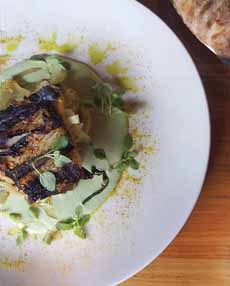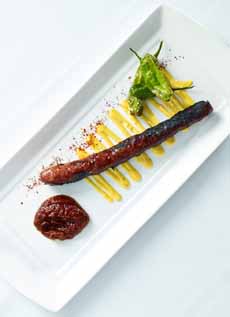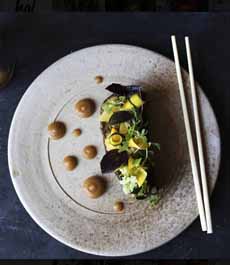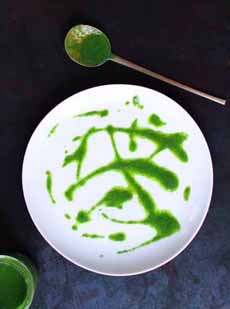|

[1] Multiple garnishes turn a piece of grilled fish into something special (photo courtesy Boutros Restaurant | Brooklyn).

[2] It can be as simple as this: an appetizer of merguez sausage and shishito peppers (shown), or steamed asparagus, or scallops, etc., accented with a zigzag of one condiment and dots of another (photo courtesy Pain D’Avignon).

[3] Underneath the garnish of zucchini curls, opal basil leaves and other herbs is a pork rib. To the side, a garnish of honey mustard polka dots, made with squeeze bottles (photo courtesy Uchi Restaurant | Hai Hospitality).

[4] Using a spatter of basil olive oil combines both the sauce and the olive oil “layers.” (photo Botanica Magazine).
|
|
Do you find that placing meat or fish on a plate with vegetables could use some oomph?
We do. That’s why we’ve taken a page from the creative chefs’ cookbook and use multiple garnishes on the plate.
HERE’S HOW TO DO IT
You’ll note in photo #1 that the chef:
1. Sauce: Added a circle of sauce to the center of the plate.
2. Vegetables: Added the vegetables (or grains, mashed potatoes, etc.) on top of the sauce.
3. Protein: Added the protein on top of the vegetables.
4. Olive oil: Added droplets of flavored olive oil around the sauce circle.
5. Spices: Sprinkled the plate with pinches of spice.
6. Herbs Or Greens: Topped with snipped herbs or microgreens. Or, if you are serving a salad, top the protein with the [lightly dressed] salad.
This works best with soft greens (mesclun or components—arugula, baby kale, baby spinach, oak leaf or butter lettuce, watercress), which “drape” better over the protein. You can use harder salad vegetables (cabbage, carrot, fennel, onion, radish, romaine, etc.), if they’re finely chopped/sliced.
None of this is hard to do. The biggest decision—and time—is deciding what sauce to use.
The sauce doesn’t have to be complicated; in fact, the easier, the better.
If you hadn’t planned for a sauce with your recipe, here are three quick options:
Purée and season vegetables, from tomatoes to steaming whatever you have on hand (bell peppers, carrots, celery, peas, etc.). Thin or thicken as desired with broth, cream, mayonnaise, olive oil, sour cream or yogurt.
You can also purée pasta sauce, add some sour cream or other dairy for a creamy sauce, or (if you prefer) serve it chunky.
Canned soups are an old stand-by. Lightly dilute cream of asparagus, mushroom, tomato, etc. with a bit of milk or broth.
GARNISHES
This list is by no means exhaustive, and what you choose will of course complement the recipe.
Look through your cabinets and fridge: You may be surprised at what you already own. (We found two jars of capers and one jar of caperberries!).
In alphabetical order:
Capers or caperberries
Caviar pearls
Cherry or grape tomatoes, halved, sliced or chopped
Chopped nuts or seeds
Citrus zest
Croutons
Crème fraîche
Curls: carrot, cucumber, zucchini
Dried herbs and spices (celery seed, chili flakes, paprika, pink/green/mixed peppercorns, anything with good color)
Fresh herbs (basil, dill, chives, rosemary, thyme)
Flavored olive oil droplets, swirls or zigzags
Favored (colored) sea salt
Gourmet condiments: flavored aïoli/mayonnaise, chili sauce, mustards
Grapes, mixed colors, halved
Grated or shaved cheese
Microgreens or sprouts
Olives, halved or chopped
Sauces (we use a lot of seasoned yogurt and pesto)
Sliced starfruit
NEXT STEP
What are you cooking for dinner tonight?
Look through your kitchen cabinets and decide how to garnish it.
And as always, have fun with it.
|





